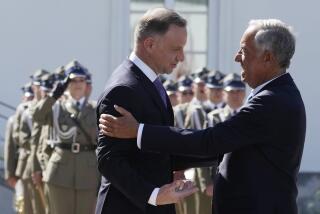Dutch Approve Missile Deployment Plan
- Share via
THE HAGUE — After six years of indecision and widespread protests, the government on Friday approved the siting of 48 nuclear cruise missiles on Dutch soil under a North Atlantic Treaty Organization deployment plan.
The deployment of the U.S.-made missiles is not scheduled to begin before 1988, however, and opposition parties vowed to reverse the decision if they win parliamentary elections next May. Joop den Uyl, leader of the opposition Labor Party, the largest in Parliament, called the decision “a black day for all those striving for an end to the nuclear arms race.
The decision is expected to trigger anti-deployment protests over the weekend, with several incidents reported Friday after the announcement was made.
In Washington, deputy White House press secretary Peter Roussel said the Reagan Administration is pleased with the Dutch action. “We welcome it as a demonstration of solid alliance unity on INF (intermediate-range nuclear force),” he said.
The Netherlands had been the last holdout of the five NATO countries set to receive a total of 572 new medium-range nuclear missiles. Friday’s decision meant President Reagan will represent a united NATO at his Nov. 19-20 summit with Soviet leader Mikhail S. Gorbachev in Geneva.
Soviet Missiles Prompted Move
The Dutch government had announced in a policy statement on June 1, 1984, that it would agree to deploy the missiles if the Soviet SS-20 deployments totaled more than 378, the number deployed in June, 1984. Last week NATO estimated SS-20 deployments at 441. The NATO deployment plan was a response to the Soviet sitings.
Prime Minister Ruud Lubbers said in a letter to Parliament: “The government was disappointed to learn from a letter received from Mr. Gorbachev last week that the Soviet Union is not prepared to match our efforts to achieve arms control and arms reductions as expressed in the (Dutch government) decision of 1 June (1984). . . .”
It added that “further deferment would undermine the credibility of the Netherlands’ policy and call into question the reliability of the Netherlands as a NATO partner.”
The letter said a decision to reject or further delay deployment “would also give the wrong impression to the Soviet Union, which could interpret it as a sign that there was still a chance of effecting a unilateral Western reduction without negotiations.”
Parliament still must approve the treaty governing the mechanics of deployment, and in his letter, Lubbers said, “The government wants to emphasize again that this decision has not ended its striving for arms control and arms reduction, but that it is guided by a wish for security and peace inside and outside the Netherlands and is still committed to reaching an arms control agreement between East and West within NATO.”
Four successive governments, facing powerful anti-missile sentiment in Parliament and the public, had put off making a decision on the issue.
Opponents in recent months gathered almost 4 million signatures on petitions against the missiles out of a total Dutch population of 14 million.
More to Read
Sign up for Essential California
The most important California stories and recommendations in your inbox every morning.
You may occasionally receive promotional content from the Los Angeles Times.













